ENGLISH GRAMMAR. Government & Binding Theory The

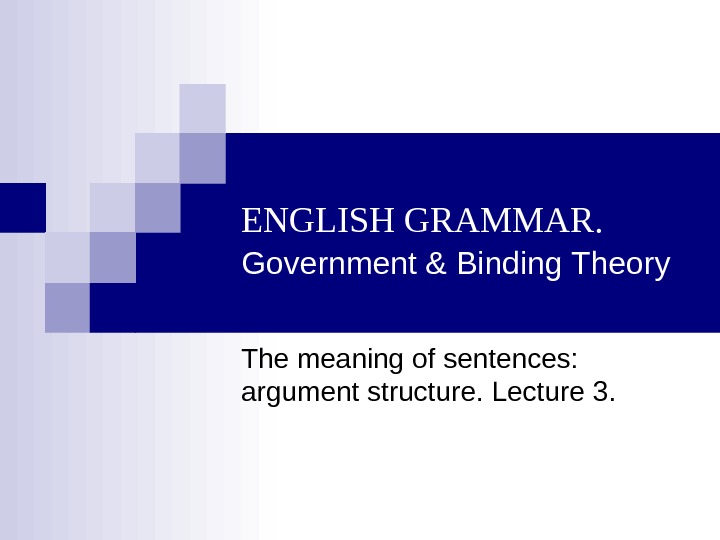
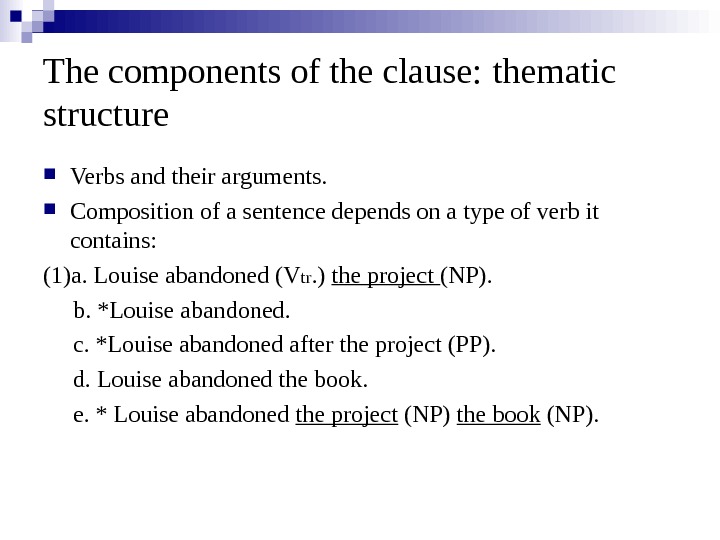
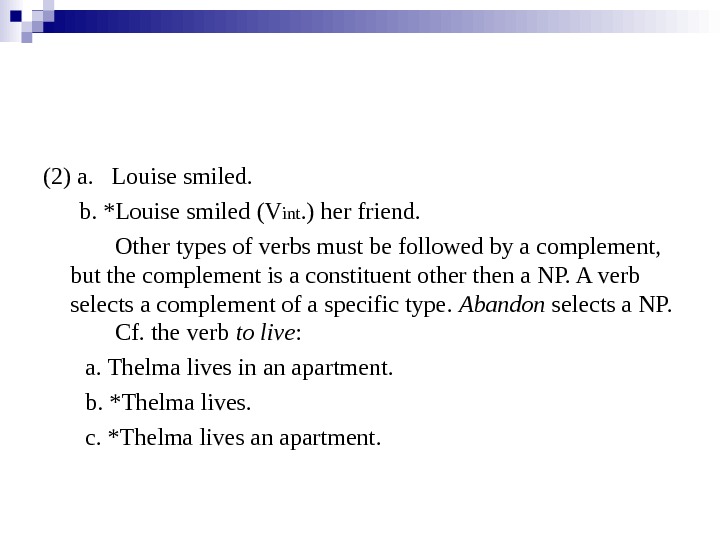
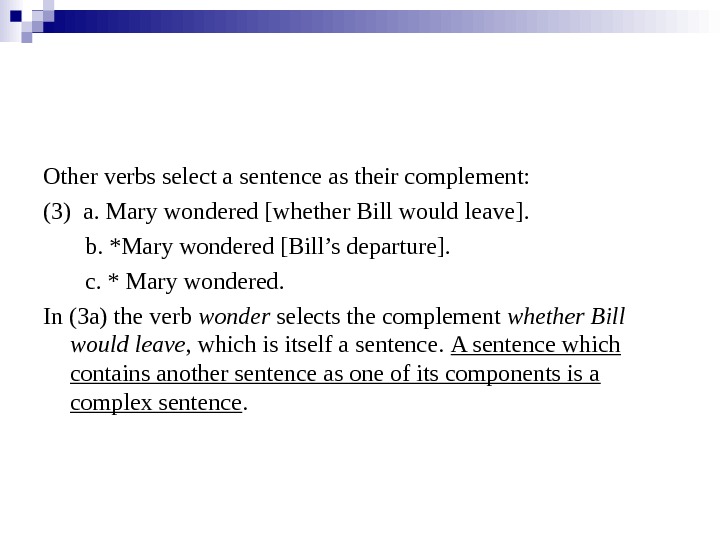


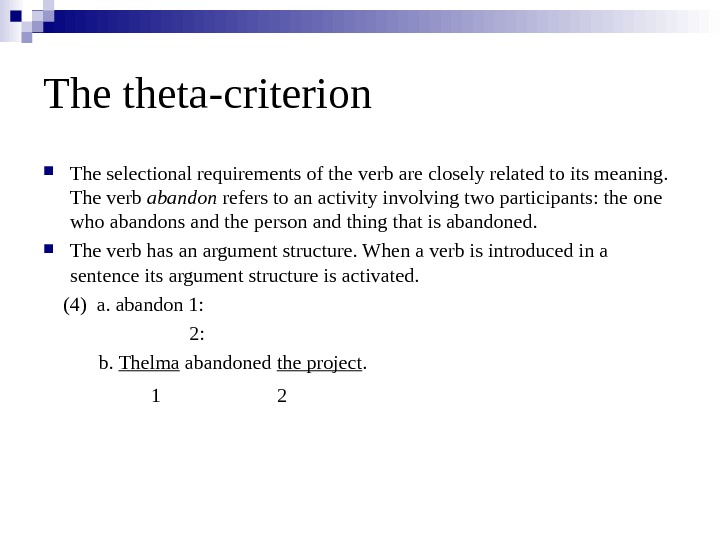

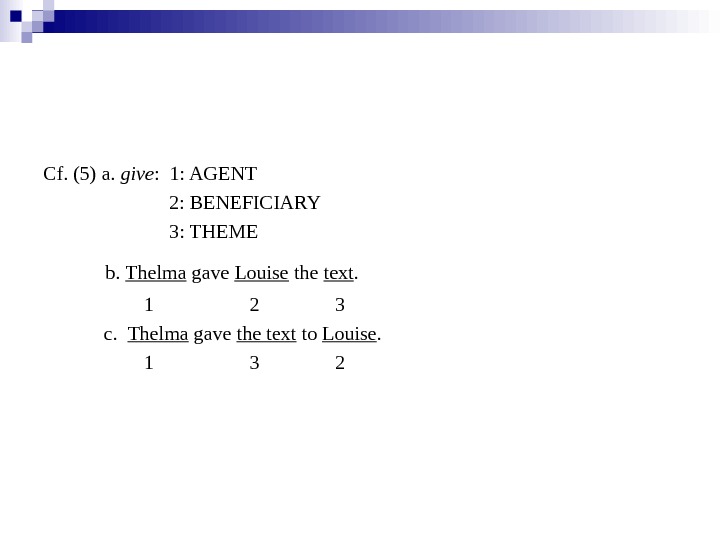
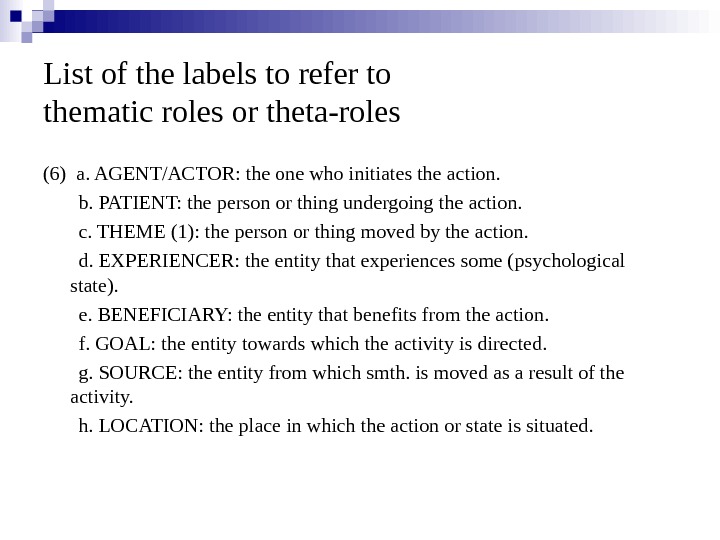
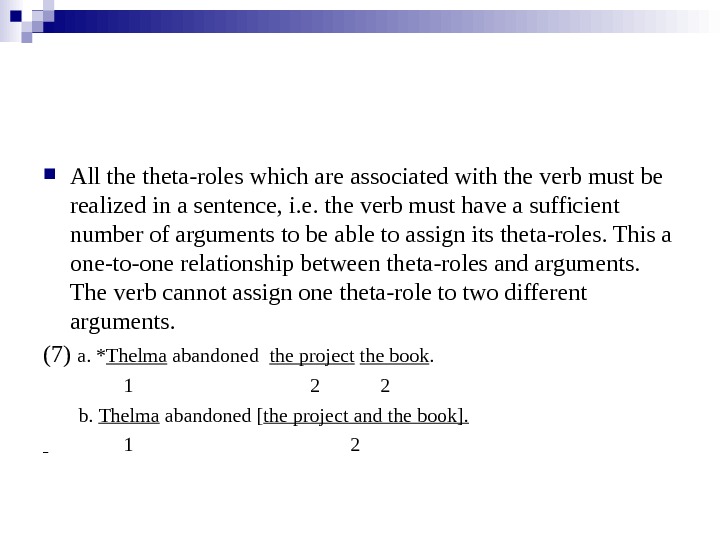
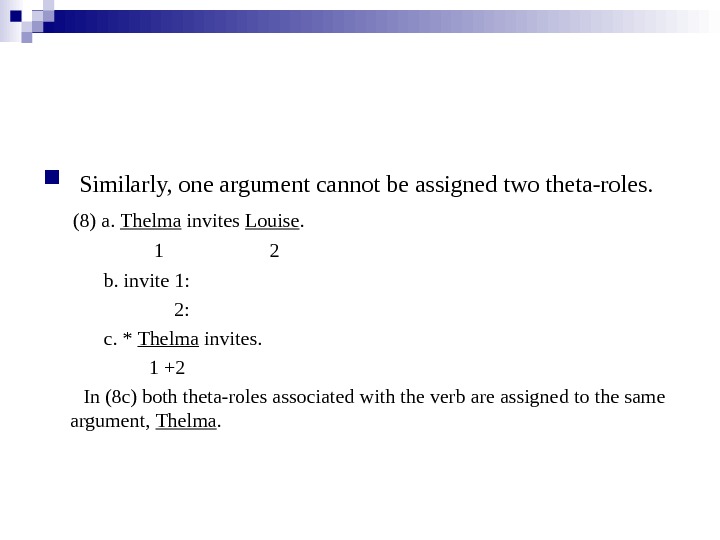
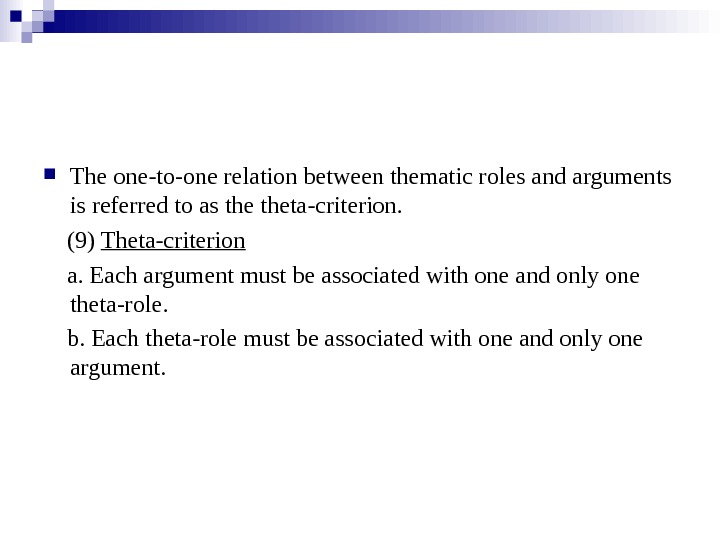
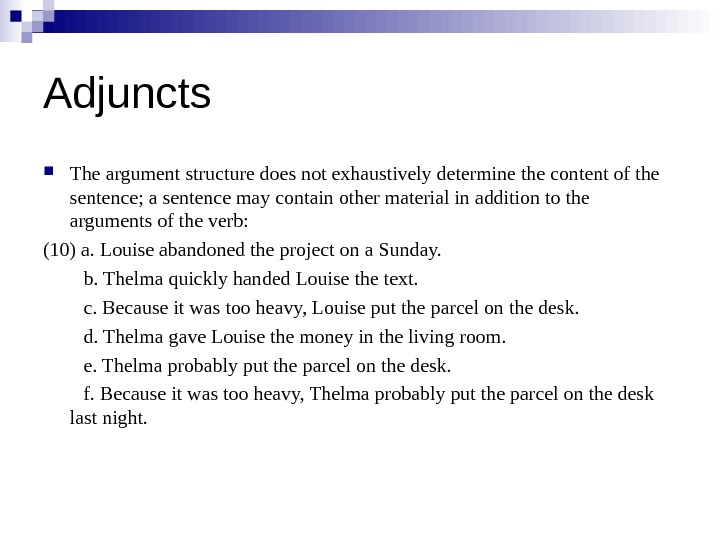
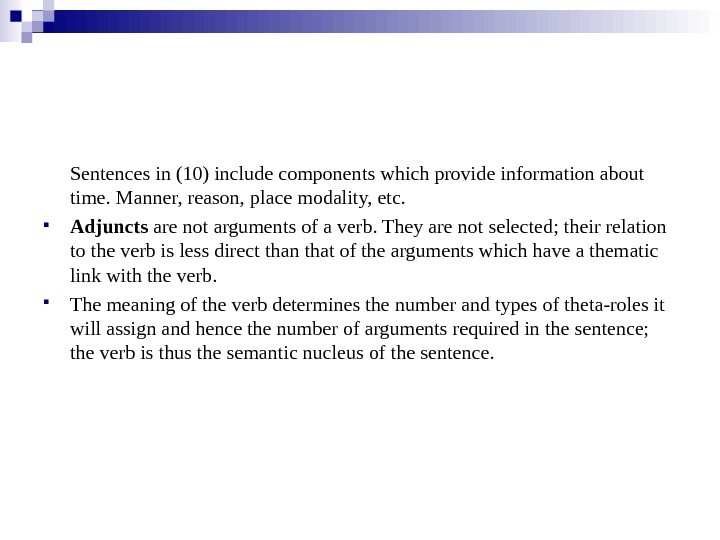
- Размер: 90 Кб
- Количество слайдов: 15
Описание презентации ENGLISH GRAMMAR. Government & Binding Theory The по слайдам
 ENGLISH GRAMMAR. Government & Binding Theory The meaning of sentences: argument structure. Lecture 3.
ENGLISH GRAMMAR. Government & Binding Theory The meaning of sentences: argument structure. Lecture 3.
 The components of the clause: thematic structure Verbs and their arguments. Composition of a sentence depends on a type of verb it contains: (1)a. Louise abandoned (V tr. ) the project (NP). b. *Louise abandoned. c. *Louise abandoned after the project (PP). d. Louise abandoned the book. e. * Louise abandoned the project (NP) the book (NP).
The components of the clause: thematic structure Verbs and their arguments. Composition of a sentence depends on a type of verb it contains: (1)a. Louise abandoned (V tr. ) the project (NP). b. *Louise abandoned. c. *Louise abandoned after the project (PP). d. Louise abandoned the book. e. * Louise abandoned the project (NP) the book (NP).
 (2) a. Louise smiled. b. *Louise smiled (V int. ) her friend. Other types of verbs must be followed by a complement, but the complement is a constituent other then a NP. A verb selects a complement of a specific type. Abandon selects a NP. Cf. the verb to live : a. Thelma lives in an apartment. b. *Thelma lives. c. *Thelma lives an apartment.
(2) a. Louise smiled. b. *Louise smiled (V int. ) her friend. Other types of verbs must be followed by a complement, but the complement is a constituent other then a NP. A verb selects a complement of a specific type. Abandon selects a NP. Cf. the verb to live : a. Thelma lives in an apartment. b. *Thelma lives. c. *Thelma lives an apartment.
 Other verbs select a sentence as their complement: (3) a. Mary wondered [whether Bill would leave]. b. *Mary wondered [Bill’s departure]. c. * Mary wondered. In (3 a) the verb wonder selects the complement whether Bill would leave , which is itself a sentence. A sentence which contains another sentence as one of its components is a complex sentence.
Other verbs select a sentence as their complement: (3) a. Mary wondered [whether Bill would leave]. b. *Mary wondered [Bill’s departure]. c. * Mary wondered. In (3 a) the verb wonder selects the complement whether Bill would leave , which is itself a sentence. A sentence which contains another sentence as one of its components is a complex sentence.
 To differentiate between the clauses in a complex structure, we refer to a clause, which is a constituent of another sentence, such as whether Bill would leave in (3 a) as an embedded clause , a subordinate or a lower clause. Mary wondered is a matrix clause. The matrix verb wonder selects a clausal or sentential complement. Cf. also (3) d. Mary wondered [about Bill’s departure]. e. Mary announced [Louise’s departure]. f. Mary announced [ that Louise was leaving].
To differentiate between the clauses in a complex structure, we refer to a clause, which is a constituent of another sentence, such as whether Bill would leave in (3 a) as an embedded clause , a subordinate or a lower clause. Mary wondered is a matrix clause. The matrix verb wonder selects a clausal or sentential complement. Cf. also (3) d. Mary wondered [about Bill’s departure]. e. Mary announced [Louise’s departure]. f. Mary announced [ that Louise was leaving].
 The structure of a sentence in a particular language is determined by principles which are universal. It is a universal property of human language that the selectional properties of the verb determine the composition of the sentence.
The structure of a sentence in a particular language is determined by principles which are universal. It is a universal property of human language that the selectional properties of the verb determine the composition of the sentence.
 The theta-criterion The selectional requirements of the verb are closely related to its meaning. The verb abandon refers to an activity involving two participants: the one who abandons and the person and thing that is abandoned. The verb has an argument structure. When a verb is introduced in a sentence its argument structure is activated. (4) a. abandon 1: 2: b. Thelma abandoned the project.
The theta-criterion The selectional requirements of the verb are closely related to its meaning. The verb abandon refers to an activity involving two participants: the one who abandons and the person and thing that is abandoned. The verb has an argument structure. When a verb is introduced in a sentence its argument structure is activated. (4) a. abandon 1: 2: b. Thelma abandoned the project.
 Argument 1 is the AGENT of the activity. It is realized by the NP which precedes the V and which will be labeled the subject of the sentence. Argument 2 refers to the element which undergoes the activity; it is referred to as the PATIENT. The distinct participant roles attributed to the arguments of the clause are referred to as thematic roles or theta-roles.
Argument 1 is the AGENT of the activity. It is realized by the NP which precedes the V and which will be labeled the subject of the sentence. Argument 2 refers to the element which undergoes the activity; it is referred to as the PATIENT. The distinct participant roles attributed to the arguments of the clause are referred to as thematic roles or theta-roles.
 Cf. (5) a. give : 1: AGENT 2: BENEFICIARY 3: THEME b. Thelma gave Louise the text. 1 2 3 c. Thelma gave the text to Louise.
Cf. (5) a. give : 1: AGENT 2: BENEFICIARY 3: THEME b. Thelma gave Louise the text. 1 2 3 c. Thelma gave the text to Louise.
 List of the labels to refer to thematic roles or theta-roles (6) a. AGENT/ACTOR: the one who initiates the action. b. PATIENT: the person or thing undergoing the action. c. THEME (1): the person or thing moved by the action. d. EXPERIENCER: the entity that experiences some (psychological state). e. BENEFICIARY: the entity that benefits from the action. f. GOAL: the entity towards which the activity is directed. g. SOURCE: the entity from which smth. is moved as a result of the activity. h. LOCATION: the place in which the action or state is situated.
List of the labels to refer to thematic roles or theta-roles (6) a. AGENT/ACTOR: the one who initiates the action. b. PATIENT: the person or thing undergoing the action. c. THEME (1): the person or thing moved by the action. d. EXPERIENCER: the entity that experiences some (psychological state). e. BENEFICIARY: the entity that benefits from the action. f. GOAL: the entity towards which the activity is directed. g. SOURCE: the entity from which smth. is moved as a result of the activity. h. LOCATION: the place in which the action or state is situated.
 All theta-roles which are associated with the verb must be realized in a sentence, i. e. the verb must have a sufficient number of arguments to be able to assign its theta-roles. This a one-to-one relationship between theta-roles and arguments. The verb cannot assign one theta-role to two different arguments. (7) a. * Thelma abandoned the project the book. 1 2 2 b. Thelma abandoned [ the project and the book].
All theta-roles which are associated with the verb must be realized in a sentence, i. e. the verb must have a sufficient number of arguments to be able to assign its theta-roles. This a one-to-one relationship between theta-roles and arguments. The verb cannot assign one theta-role to two different arguments. (7) a. * Thelma abandoned the project the book. 1 2 2 b. Thelma abandoned [ the project and the book].
 Similarly, one argument cannot be assigned two theta-roles. (8) a. Thelma invites Louise. 1 2 b. invite 1: 2: c. * Thelma invites. 1 +2 In (8 c) both theta-roles associated with the verb are assigned to the same argument, Thelma.
Similarly, one argument cannot be assigned two theta-roles. (8) a. Thelma invites Louise. 1 2 b. invite 1: 2: c. * Thelma invites. 1 +2 In (8 c) both theta-roles associated with the verb are assigned to the same argument, Thelma.
 The one-to-one relation between thematic roles and arguments is referred to as theta-criterion. (9) Theta-criterion a. Each argument must be associated with one and only one theta-role. b. Each theta-role must be associated with one and only one argument.
The one-to-one relation between thematic roles and arguments is referred to as theta-criterion. (9) Theta-criterion a. Each argument must be associated with one and only one theta-role. b. Each theta-role must be associated with one and only one argument.
 Adjuncts The argument structure does not exhaustively determine the content of the sentence; a sentence may contain other material in addition to the arguments of the verb: (10) a. Louise abandoned the project on a Sunday. b. Thelma quickly handed Louise the text. c. Because it was too heavy, Louise put the parcel on the desk. d. Thelma gave Louise the money in the living room. e. Thelma probably put the parcel on the desk. f. Because it was too heavy, Thelma probably put the parcel on the desk last night.
Adjuncts The argument structure does not exhaustively determine the content of the sentence; a sentence may contain other material in addition to the arguments of the verb: (10) a. Louise abandoned the project on a Sunday. b. Thelma quickly handed Louise the text. c. Because it was too heavy, Louise put the parcel on the desk. d. Thelma gave Louise the money in the living room. e. Thelma probably put the parcel on the desk. f. Because it was too heavy, Thelma probably put the parcel on the desk last night.
 Sentences in (10) include components which provide information about time. Manner, reason, place modality, etc. Adjuncts are not arguments of a verb. They are not selected; their relation to the verb is less direct than that of the arguments which have a thematic link with the verb. The meaning of the verb determines the number and types of theta-roles it will assign and hence the number of arguments required in the sentence; the verb is thus the semantic nucleus of the sentence.
Sentences in (10) include components which provide information about time. Manner, reason, place modality, etc. Adjuncts are not arguments of a verb. They are not selected; their relation to the verb is less direct than that of the arguments which have a thematic link with the verb. The meaning of the verb determines the number and types of theta-roles it will assign and hence the number of arguments required in the sentence; the verb is thus the semantic nucleus of the sentence.

